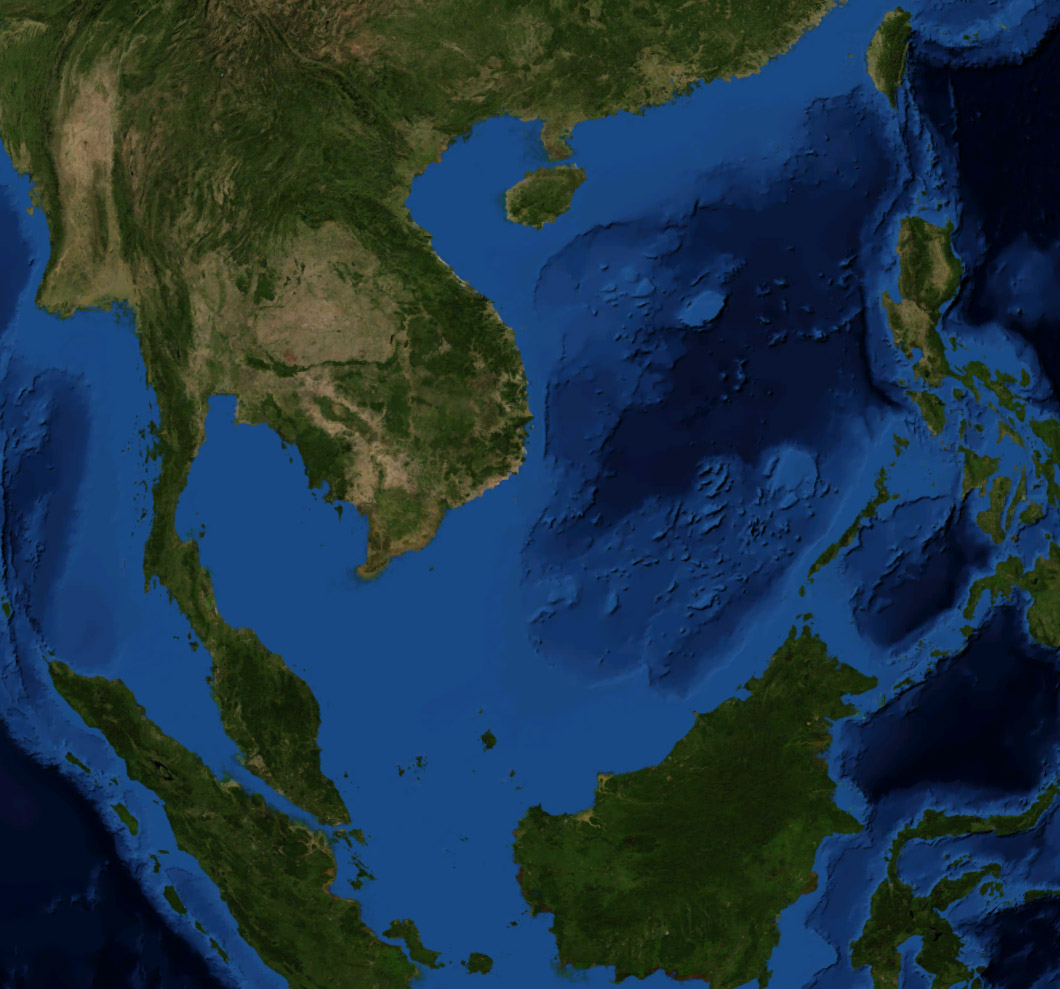News
PH ‘cautious’ in drawing conclusions on latest SCS activities

FILE: Satellite Picture of the South China Sea (Photo by Serg!o – Satellite pictures, from NASA World Wind Globe, version 1.4, Public Domain)
MANILA – The Philippine government prefers not to make hasty conclusions on the reportedly latest reclamation activities in the hotly-contested South China Sea (SCS), National Security Adviser Clarita Carlos said Friday.
This, after Carlos was informed by Chinese Ambassador to the Philippines Huang Xilian on Thursday that it was Vietnam that was actually reclaiming land in the SCS.
“Ang sinabi niya (Huang) kasi kahapon, ‘clinaim ng Bloomberg na sa China ‘yun. Actually sa Vietnam ‘yun’. So, part ng investigation. Kaya siguro huwag tayong padalos-dalos sa conclusion natin. (He said yesterday, Bloomberg is claiming that it was China, but it was actually Vietnam [which is behind the reclamation activities]. So, that’s part of the investigation, that’s why perhaps, we should not make hasty conclusion),” Carlos said in a radio interview.
“Kaya ako wala akong conclusion na mashi-share sa inyo kasi ongoing pa ang investigation. So, huwag din tayong magkaroon ng determination hanggang wala pa talagang masusing imbestigasyon (That’ why I could not share any conclusion because the investigation is still ongoing. So, let us avoid making assumptions while the results of the thorough investigation are not yet out),” she added.
The Chinese Embassy in Manila earlier dismissed as “fake news” the Bloomberg report on China’s supposedly new land reclamation activities in unoccupied features of the Spratlys.
The Chinese Embassy, citing a Twitter post by China-based research group SCS Probing Initiative (SCSPI), said sandbars and formations of Lankiam Cay, Eldad Reef, and Whitsun Reef “naturally change every year,” while Sandy Cay is “indeed in reclaiming” by Vietnam.
Honor international law
Carlos noted that during her meeting with Huang, she emphasized the importance of upholding the United Nations Convention on the Law of the Sea (UNCLOS).
China, as one of the signatories to UNCLOS, must honor the international treaty that lays out a comprehensive legal framework governing all activities and uses of the world’s seas and oceans, Carlos said.
“Kailangan sumunod sila diyan kasi ano ba naman susundan natin (They should follow that because what would we follow)? We are just living in one planet. At isa lang ang international law, unless meron silang ibang international law na sinusunod na wala naman. Iyan ang ini-stress ko kay Ambassador Huang Xilian kahapon (There is only one international law, unless they are following other international law which does not exist. That’s what I am stressing to Ambassador Huang Xilian yesterday),” she said.
Carlos said she also relayed to Huang the Philippines’ concern over China’s reported activities in SCS, despite the fact that Manila already sent over 100 notes verbales to Beijing.
‘Continuous critical dialogue’
Considering the latest developments, Carlos stressed the need for “continuous critical dialogue” to settle the SCS disputes.
She added that the Philippines should also pursue not just a bilateral approach but also multilateral consultations on SCS issues.
“Hindi lang dapat bilateral ang ating ano, ibig sabihin Philippines at China. Tumukod tayo sa mga ibang bansa na ganoon din ang interes nila, na pangalagaan talaga ang mga resources diyan sa South China Sea. Isda ang talagang pinaka-importanteng resource diyan. Food security natin ang nakasalalay diyan (We should not just seek bilateral dialogue between the Philippines and China. Let’s consult other countries whose interest is to protect the resources in the South China Sea. Fish is the important resource there. Our food security depends on that),” Carlos said.
Carlos expressed confidence that President Ferdinand R. Marcos Jr. will raise the SCS issue with Chinese President Xi Jinping during his visit to China in January 2023.
Book for ‘regional fishing deal’
As part of the effort find to address the maritime disputes in the SCS, Carlos revealed that she is writing a book which contains a recommendation to pursue a “regional fishing agreement” that will benefit all the sea claimants.
Carlos said she would seek Marcos’ approval to publish the book, once she is able to complete its five chapters.
“‘Yung libro na ‘yun, magkakaroon ng proposal. Actually, marami na ngayong mga fishing agreement kaya lang mga bilateral sila, almost bilateral. Pero ito, kung magkaroon tayo ng regional fishing agreement (That book contains a proposal. There are already existing fishing agreements but they are only bilateral agreements. The book seeks regional fishing agreement),” she said.
“Kasi pag regional fishing agreement, hindi lang ang China ang magde-declare ng fishing holiday. Dapat kailangan lahat ay mag-agree na magkakaroon ng fishing holiday (If we push for the regional fishing agreement, China could not declare a fishing holiday. All concerned parties need to agree if there is a need to declare fishing holiday),” Carlos added.





















